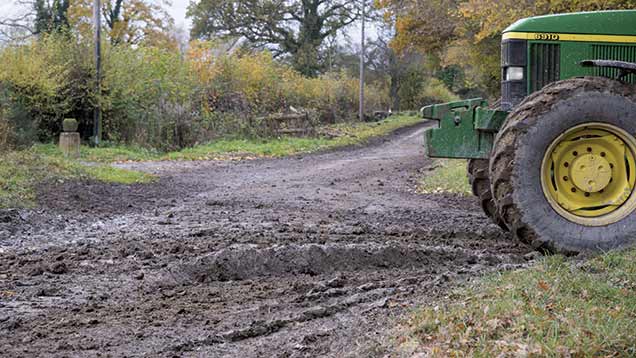Mud on the road: A farmer’s responsibility explained
 © John Eveson/FLPA/Rex
© John Eveson/FLPA/Rex Farmers Weekly’s Business expert Peter Cusick gives advice on your responsibilities with regards to depositing mud on the road.
Q: I farm and have an ongoing problem with mud on the road. I have seen varying things about what I have to do,what I ought to do and what I might be liable for. What is the actual position? I want to get it right.
A: The Highways Act 1980 makes it an offence to deposit mud and other things on the highway (S148). In addition, the act provides that if a person without lawful authority or excuse deposits anything whatsoever on a highway in consequence of which a user of the highway is injured or endangered, then he is guilty of an offence (S161).
Therefore, if you deposit mud on the highway you run the risk of committing a criminal offence and may face prosecution and a fine.
It is not very well known but in addition, if there is significant mud on a vehicle, such as a tractor, it may constitute the more serious offence of dangerous driving under the Road Traffic Act 1988. This is because S2A of that act states that the term “dangerous” can include anything attached to a vehicle (which can include mud).
See also: How to prove losses from feed supplied
However, I think it would have to be a significant amount of mud, and/or a serious accident and/or a repeat offender before the police would be likely to consider bringing this additional charge.
If you are an employer, you have additional duties under the Health and Safety at Work Act 1974 and must look after employees’ health and safety and that of anyone who may be affected by their working operations. For tractor drivers this is likely to include road users.
As well as potential criminal offences, you also run the risk that you may be liable to be sued in nuisance and/or negligence for the damages caused.
This may include personal injury, damage to property and any other losses or inconvenience caused. If you are a tenant this may also, depending on the facts, apply to any landowner and any contractor.
If you deposit mud on the road then a local authority has the power under the Highways Act to give notice to require you to remove it.
If you fail to comply with the notice the authority may then make a complaint to a Magistrates’ Court for a removal and disposal order. The local authority can also remove the deposit itself and charge you the removal costs.
In my view there are certain things farmers must do:
- Everything possible to prevent mud being deposited on the road. This includes cleaning mud from vehicles, as far as practical, before they are taken on to the road (if you have many lorries, the local authority may insist upon an automated wheel wash to ensure all vehicles accessing and leaving the site are cleaned).
- If there is a danger of mud being accidentally deposited on roads, use “Slippery Road” signs with a “Mud on Road” sub-plate to alert other road users. Check with your local Highways Authority for its requirements as to warning signs at the side of the road.
- Clean the road as necessary during the working day and always at the end of the working day.
- Ensure that labour and equipment is available and is suitable for the soil and weather conditions present.
- Where a contractor is used, ensure that prior agreement is reached on who is responsible for mud on the road issues (signage, cleaning and so forth); best practice is to document this. Also, ensure that adequate public liability insurance is in place.
In addition there are some things farmers should do:
- Be prepared to hire equipment – check availability in advance.
- Keep to their own farm roads and minor roads whenever possible.
- Keep to low speeds – especially when travelling a short distance – to help retain mud on the vehicle.
- Keep a written record of their decisions on whether or not to deploy signs and/or to clean the road. This is important because in the event of an accident/injury and any subsequent investigation/prosecution/claim, it may assist a case.
The information provided in these articles does not constitute definitive professional advice and is provided for general information purposes only.
Do you have a question for the panel?
Outline the issue in no more than 350 words and Farmers Weekly will put your question to a member of the panel. Please give as much information as possible and send your inquiry to Business Clinic, Farmers Weekly, RBI, Quadrant House, The Quadrant, Sutton, Surrey SM2 5AS. You can also email your questions to fwbusinessclinic@rbi.co.uk or post your question as a comment below this story.

